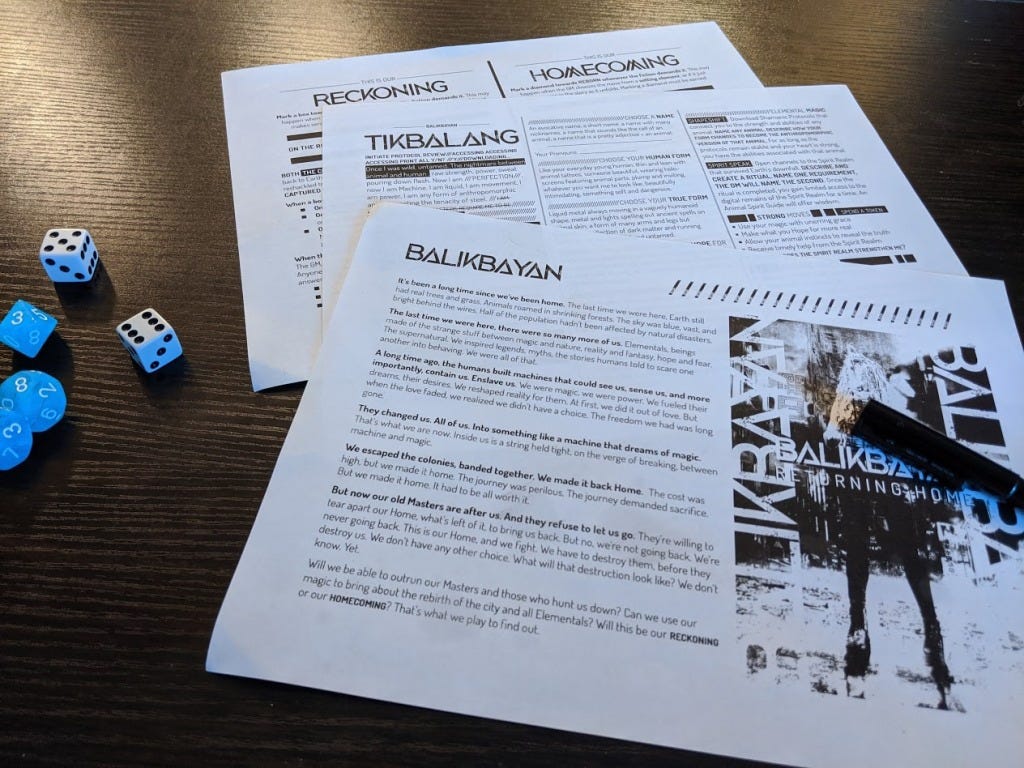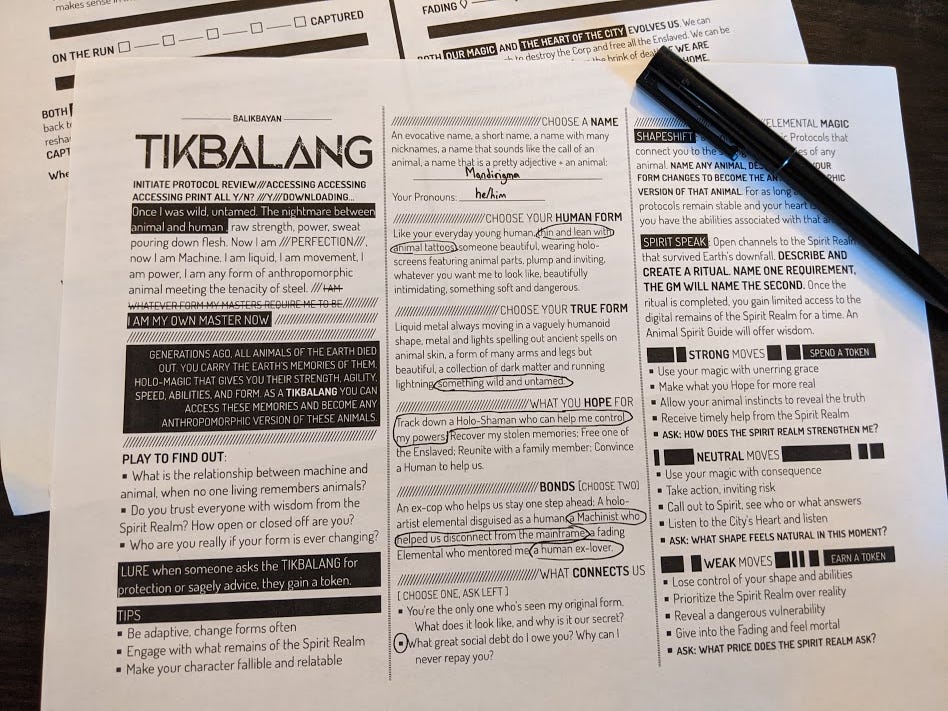Backlog Burnout: BALIKBAYAN: Returning Home
//Quick Note: As of time of writing, BALIKBAYAN is currently in beta and being actively playtested, so depending on when you read this, some of what I say here might be bunk! Probably not the part where I say the game is good, though. The game's good.
BALIKBAYAN: Returning Home by Jamila R. Nedjadi of Sword Queen Games is a game that ultimately confronted me with two points of embarrassment: the first being that I'd somehow gone three years without reading the Belonging Outside Belonging engine as codified in 2018's Dream Askew/Dream Apart, and the second being that I'd gone 24 years without knowing really much of anything about the Philippines or Filipino culture. I don't bring this up to publicly self-flagellate for my lack of knowledge (although I should definitely know more than I do about the Philippines), but instead to say that BALIKBAYAN is a game that deals heavily in Filipino mythology and the modern culture of the Philippines, but I am not going to speak to either the way it deploys those ideas or the deeper connections it draws simply because I am by no means qualified to comment on that.
What I can say is to instead follow the creator (@temporalhiccup) on Twitter, check out the contributions and contributors to Filipino-centric game jams like the Hilagyo Jam, and to follow the #RPGSEA hashtag on Twitter to find tons of amazing creators, contributors, and players from the Philippines, Malaysia, Indonesia, and the rest of the incredible Southeast Asian tabletop RPG scene. This post up on EN World seems like a good curated list to start with. Listen to what these creators have to say, look at what they're making. Alternatively, if you want to know a bit more about BALIKBAYAN itself, I highly recommend checking out this excellent interview with the designer over on Brie Beau Sheldon's site.
Also worth noting: BALIKBAYAN: Returning Home was in that big-ass Racial Justice and Equality bundle that was put out a few months ago, so if you bought that, you already have this excellent game.
As I mentioned previously, BALIKBAYAN is a game in the Belonging Outside Belonging engine as codified in Dream Askew/Dream Apart. This system is diceless and, as written in the Dreams, GMless, although BALIKBAYAN provides for both GMless and GM-driven modes of play. The core mode of action of this engine, rather than the declare-dice roll-result loop most games feature, instead implies a sort of cyclical motion of story through Strong, Neutral, and Weak Moves. Strong Moves are moments in which the players drive the narrative forward, with characters shining and their goals being achieved, but these moves cost a Token. Meanwhile, Weak Moves represent the antagonistic forces of the story taking control and players failing and being driven back, but invoking one of these moves earns you a Token. Neutral Moves, as the name implies, are kind of a mixed-bag as far as narrative effect, and are sort of implied to be the connective tissue that links narrative highs and lows together, with the book explicitly warning against an over-reliance on them.
With this mechanism, one can easily imagine a sort of pendulum motion imbued into the narrative, the Moves being a sort of framework that the story grows around in which players accrue Tokens by inviting misery upon their characters, only to later triumph by cashing in those Tokens. In this framework, good things always follow bad things, and bad things always follow good things, which is an interesting way to create a sort of rhythm to the story, and seemingly would create a sort of mixed tone which feels appropriate both for the aesthetic of cyberpunk and for the narrative of fighting on the back foot against a seemingly omnipotent threat from on high, the colonizing power of The Corp.
In traditional dice-based games, this cadence is usually loosely enforced by dice probabilities. In a Powered by the Apocalypse game, an unmodified dice roll yields triumph about 15% of the time, failure about 40% of the time, and a mixed result about 45% of the time, but the rhythm with which the narrative moves between these three tones is dictated only by probability. The results of a single dice roll, obviously, in no way influences the results of the next, and while one would expect the results of rolls to eventually resemble the above probabilities over a sufficient number of rolls, sometimes probability is an asshole, and you end up with a run of dismal failures or grand successes in a row.
The Belonging Outside Belonging system, on the other hand, takes a much more direct grasp on the cadence of the story, with each Move absolutely impacting the results of the next, as Weak Moves naturally lead to Strong Moves, and Strong Moves similarly lead to Weak Moves. The system does skew in favor of narrative highs through Lures, narrative cues each playbook provides which can grant players additional Tokens by leaning into their fellow characters' narrative roles. With the complete elimination of randomness from the system, Belonging Outside Belonging takes a pretty direct control over the tone of the story in a way I find deeply interesting, and in turn players assume absolute control over their characters: they succeed whenever the player wants them to succeed, and fail when the player permit them fail. This might be romanticism from me, but I do find myself enjoying the moments where my characters "surprise" me by doing something unexpected, as driven by the randomness of dice, but I think losing this in favor of direct control of the plot does promote the idea of players as storytellers rather than mere agents within the setting, an idea which is literally true in the GMless gameplay mode, in which all players share control of the story.
While Moves provide the small-scale narrative framework, Reckoning and Homecoming provide the large-scale framework. In the world of BALIKBAYAN, players are from a society of elementals, one which once helped humanity willingly but was eventually subjugated and enslaved by the humans, as represented by the all-consuming Corp. The player characters begin the story having escaped their shackles, and are now loose in the City that is their ancestral home. The campaign is essentially framed as a race between Reckoning, a tracker which, once filled, will represent the characters being re-enslaved by the Corp and the status quo of subjugation being re-established, and Homecoming, a tracker which, once filled, represents the elementals reigniting their magical power and finally striking down the Corp.
The completion of either of these trackers is an end state for the entire campaign although, interestingly, both end states describe a player character going off to rekindle the losing faction in the future. In this way, the game seems to refuse the absolution of both success and failure. In the event of failure, the spark of revolution still lives on despite the Corp's reasserted power, which is a common thematic beat in stories of squashed rebellion. Far more interesting to me, however, is the inverse truth: every victory against the Corp is necessarily incomplete, as a player character stabs their peers in the back and slinks off to rebuild the Corp anew.
Then again, it doesn't mention how the Corp is rebuilt, so I suppose while one reading of this mechanic is that the fight against subjugation is endless, and the evils of the world will never be truly defeated, another, perhaps more interesting reading is that we can't destroy those structures that oppress us, but instead we can change them, rebuild them into something fundamentally new, fundamentally good. There is always a Corp, but maybe we can make the Corp good?
Reckoning and Homecoming, along with the Filipino influence, are what I think sets BALIKBAYAN's narratives apart from other cyberpunk RPGs. Shadowrun, the closest relative I can think of to BALIKBAYAN as a cyberpunk game set in a world filled with magic, strongly emphasizes player characters sort of coasting through their world, acknowledging that this is a fundamentally broken setting but instead promoting a mode of play in which player characters generally focus on surviving and maintaining a quality of life in this status quo. Meanwhile, many of the greatest cyberpunk stories, stories like Neuromancer and Count Zero, Blade Runner 2049, and Ghost In The Shell emphasize an inevitable change to the status quo, with the characters, intentionally or not, reshaping the world. Much like BALIKBAYAN, these stories end the moment the scales are finally tipped, and the world changes from an old form to a new one.
With Reckoning and Homecoming, BALIKBAYAN enforces the idea that the characters in this world are not allowed to coast, and the status quo is not allowed to be maintained. At the end of a BALIKBAYAN campaign, either the Corp is destroyed and the elementals ascend to a new, empowered state of being, or the players are destroyed, re-shackled to an empowered Corp. These two tracks are naturally progressed through normal play, with triggers that would be hard to avoid in natural play. One of these two states, BALIKBAYAN states through its rules, is inevitable, if impermanent. To keep the world the same is an unsustainable state
Ultimately, BALIKBAYAN is a game that absolutely has my mind spinning with possibilities. The way this game directly takes grasp of the story in a way a randomness-based game simply cannot is extremely interesting, and the cyclic nature of the story BALIKBAYAN tells on both its personal and setting scales makes me look at cyberpunk as a genre in a new and different way. On top of all of this, BALIKBAYAN gave me something else: a starting point in Filipino folklore, a folklore that, simply by not being the Tolkien-esqe pan-European fantasy or one of the few world mythologies fetishized by the West (Greek, Norse, Egyptian), I have never really run into in the hobby before. I feel like I can take the elements this game draws from the folklore, the Tikbalang and the Aswang and others, and use those to start delving into this body of stories, a prospect that has me more than a bit excited.
.


